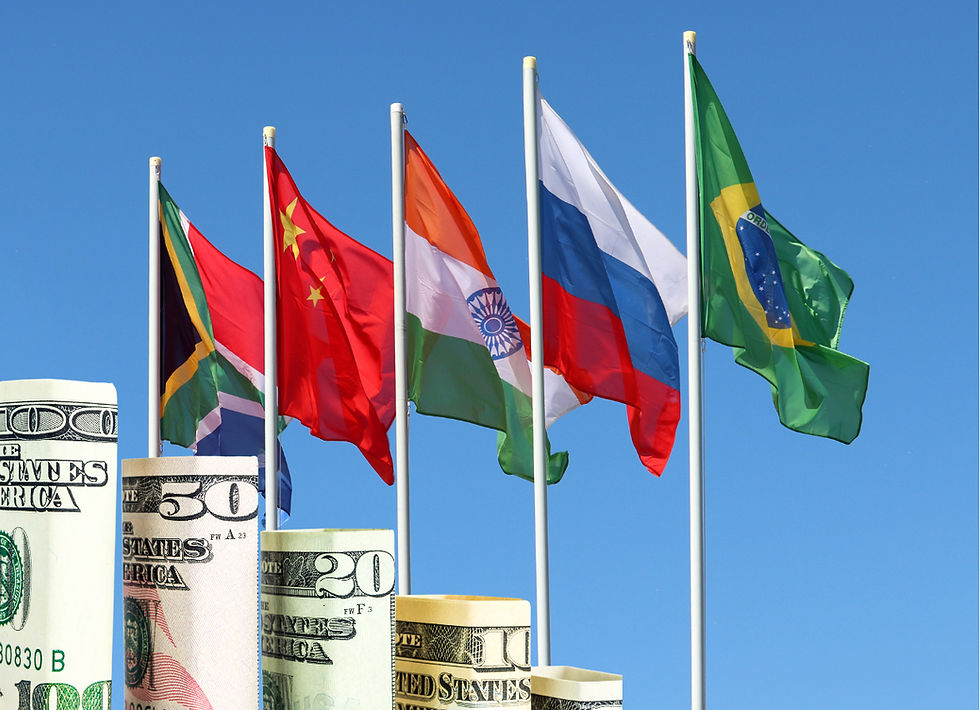What is De-dollarization and What is its Impact on the Price of Gold?
- ccancino3
- Oct 25, 2024
- 3 min read
For decades, the US dollar has been the global reserve currency, but the growing distrust of its stability and the expansionary US monetary policies have prompted many countries to look for alternatives. In this scenario, gold stands out as a real, safe asset capable of preserving long-term purchasing power despite the economic volatility.

Dedollarization: A Global Phenomenon
De-dollarization is the process by which countries and economies seek to reduce their dependence on the US dollar in international trade and in their monetary reserves. In the last decade, this phenomenon has gained strength, driven by factors such as search for economic sovereignty by countries not aligned with the United States.
The bilateral agreements that facilitate trading in other currencies are on the rise, challenging the dominance of the US dollar. The BRICS bloc, made up of emerging economies such as Russia, China and Brazil, is leading the effort to create a more balanced monetary system, where gold and other coins play a central role.
The Loss of Value of the Dollar
The US dollar has been the standard reserve currency since the end of World War II, under the Bretton Woods system, which tied the value of the dollar to gold. This system guaranteed stability until 1971, when the dollar was no longer backed by gold, giving way to a system based solely on trust.
While Nixon justified this measure as temporary, the true purpose was to allow unrestricted money printing, which has generated sustained inflation, reduced the value of the dollar and weakened the global confidence in it. The United States' ability to print money at will allowed the country to manage its incessant deficits resulting from its excessive level of spending, but at the cost of an uncontrolled increase in its debt and of the erosion of the global monetary stability.
The expansion of the money supply, low interest rates and uncontrolled debt growth have exacerbated the dollar's loss of value. The United States federal deficit reached $1.8 trillion during the third quarter of 2024, the highest level in three years. Despite sustained economic growth, the government continues to spend more than it earns, increasing the pressure on the dollar. This situation has generated concern, especially in emerging economies that depend on dollar financing, and has accelerated the search for alternatives.
Gold: A Safe Haven
As the dollar loses value, the interest in gold has significantly grown. The central banks of several countries have increased their gold reserves as a form of diversification and protection against the depreciation of the dollar. Additionally, individual investors are turning to gold in order to mitigate the risks of inflation and economic instability.
The resurgence of interest in gold is not a coincidence, but a logical response to the growing global economic tensions. De-dollarization and loss of confidence in the current financial system are driving greater demand for real assets that can preserve long-term value.
Gold vs Dollar throughout the Years
Source: James Eagle (eeagli.com)
Implications for Investors
The trend towards de-dollarization has profound implications for investors. In an environment of growing uncertainty, diversifying portfolios with tangible assets such as gold has become an attractive strategy. Not only does gold act as a hedge against dollar volatility, but it also protects against inflation and other forms of monetary devaluation.
For the BRICS countries and other emerging economies, gold may also play a crucial role in creating a more balanced financial system, where trade transactions and monetary reserves do not depend on the dollar, and are therefore free from the risk of seizure by the United States. This reflects a shift in the global economic power balance, where gold becomes a key piece to ensure financial stability in the future.
In a scenario where de-dollarization and monetary instability are becoming the norm, gold reaffirms its role as a pillar of economic stability and a reliable option to preserve value against the global financial risks.
Protect Your Money
Aktagold's mission is to help people around the world to protect their money from the economic and financial instability of their countries of origin, by providing them with access to saving in physical gold, safely stored in high-security vaults in Canada, an option that used to be reserved only for the wealthiest ones.
Contact us and learn more about how to protect your wealth by saving in gold.
